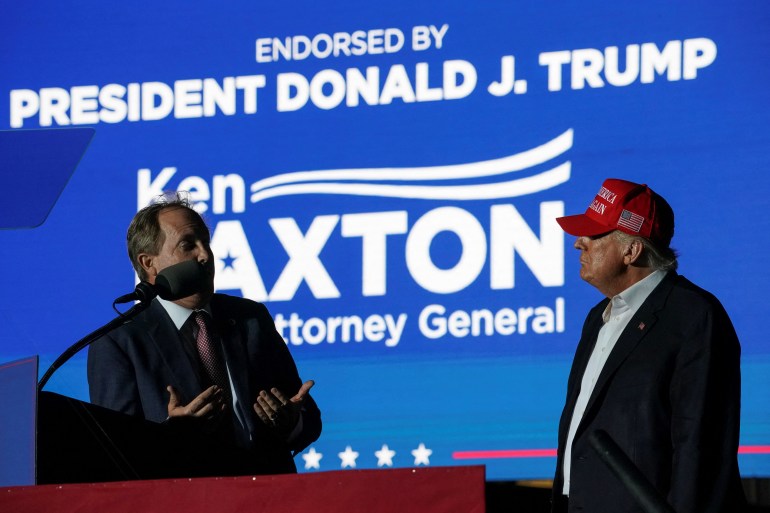Paxton, who won reelection again in November, has gained a national reputation as a far-right gadfly to Democratic President Joe Biden, whose policies he regularly challenged in court.
But the 60-year-old Paxton has long been embroiled in investigations and legal peril, and in May, he became the third sitting politician in Texas’s 178-year history to be impeached.
Now, the state Senate is weighing the accusations against him, to determine whether his time as attorney general has come to an end.
Though Texas is a Republican-led state, Paxton’s corruption trial could test the party’s tolerance for scandal. Here’s all you need to know about the ongoing impeachment trial.
Who is Ken Paxton?
Since 2015, Paxton has served as Texas’s attorney general, a key elected position in the state.
Not only is the attorney general the state’s top lawyer and law enforcement official but whoever occupies that role can also sue the federal government — a power Paxton has exercised frequently.
Since Biden became president, Paxton has challenged numerous federal policies, from spending packages to endangered species designations. Over a dozen lawsuits alone have taken aim at Biden’s immigration policies.
That confrontational style catapulted Paxton to the national stage, making him a far-right darling. He even led a petition to overturn the 2020 presidential election, throwing his weight behind Donald Trump’s unsubstantiated ballot fraud claims.
But the US Supreme Court ultimately rejected his case.

When was Paxton impeached?
On May 27, the Texas House of Representatives overwhelmingly voted to impeach Paxton, despite a strong Republican majority in the chamber. The vote was 121 to 23.
He was immediately suspended from office, though not fired. It is up to the state Senate to decide whether to remove him from his position. That trial is ongoing.
Why was Paxton impeached?
Paxton originally faced 20 articles of impeachment, accusing him of everything from bribery to obstruction of justice to abuse of public trust.
Three of the articles concerned a securities fraud case stretching back to 2015, before Paxton took office. At the time, Paxton had been accused of misleading investors, encouraging them to buy shares in a tech start-up he was actually receiving money from.
The articles of impeachment reference that incident, saying Paxton abused the judicial process to obscure his involvement in the case. That, in turn, “deprived voters of a chance to make an informed decision when voting for attorney general”.
But the majority of the impeachment articles focused on his involvement with a wealthy real estate investor named Nate Paul.
In 2019, agents for the Federal Bureau of Investigation raided Paul’s home and offices, as part of a probe into his business dealings.
Paul — a donor to Paxton’s reelection campaign — allegedly appealed to the attorney general for help, and Paxton is said to have responded by appointing a special prosecutor to look into Paul’s concerns.
But seven members of Paxton’s own staff then issued a whistleblower complaint, calling for an investigation into the attorney general’s dealings with Paul. The resulting 16 articles of impeachment accuse Paxton of misusing his power to shield allies, exchange bribes and retaliate against the whistleblowers.
They form the basis for the ongoing state Senate trial.

What does Paxton’s love life have to do with his impeachment?
Paxton is accused of having an affair with Laura Olson, a former aide to state Senator Donna Campbell, a fellow Republican.
While having extramarital relations is not a crime, what happened next amounted to an act of bribery, according to prosecutors in the impeachment case.
Paxton allegedly used his influence to get Olson a job with Paul, the real estate developer. In exchange for hiring Olson, the impeachment articles say Paul “received favourable legal assistance from, or specialised access to, the attorney general’s office”.
Who decides whether Paxton is guilty?
After Paxton was impeached in May, it was up to the Texas state Senate to hold a trial to determine whether to convict him.
That trial began on September 5 with a reading of the 16 articles of impeachment he faces. The other four articles originally presented in the state House of Representatives will be considered at a later date.
The state Senate is composed of 31 members, 19 of them Republicans like Paxton. But one has a conflict of interest: Angela Paxton, his wife. She is therefore disqualified from participating in the trial, though she is nevertheless required to attend.
A two-thirds majority, composed of 21 state Senators, is required in order to convict Paxton on any of the 16 impeachment articles.

How has Paxton responded to the allegations?
Paxton has pleaded not guilty to the impeachment charges. On the day the trial started, the suspended attorney general thanked his supporters and issued a note of defiance, writing on social media, “I will never back down for defending freedom.”
He has frequently been a no-show throughout the trial, though his presence was not required.
What happens next?
Government prosecutors rested their case on Wednesday. Both the defence and the prosecution have a cap of 24 hours to present evidence and question witnesses.
Once both sides make their case and present their final arguments, the state Senators will vote on the impeachment charges. If Paxton is acquitted, he will be allowed to resume his office.
However, if any of the 16 impeachment articles are upheld and Paxton is convicted, he will immediately face removal from his elected office. That would raise the possibility of a further vote to determine whether he should be barred from holding public office in the state ever again.
Who else has been impeached in Texas?
Only two other sitting politicians have ever been impeached in Texas. In both cases, they were not only removed from office but also blocked from running again in the state.
The most recent case came in 1975, when District Judge OP Carillo was impeached for misusing county resources and evading taxes. But the first case involved a governor, the highest executive position in the state.
James Ferguson, the 26th governor of Texas, was impeached during his second term in 1917 for misapplication of government funds, receiving money from an undisclosed source and other charges.
But he continued to hold significant sway over Texas politics. When his wife Miriam Ferguson was elected to the governor’s mansion, she promised voters would get “two governors for the price of one”.
Paxton and James Ferguson are the only two sitting statewide politicians to be impeached in Texas.
